ERICTOUREM -Contributing Writer-
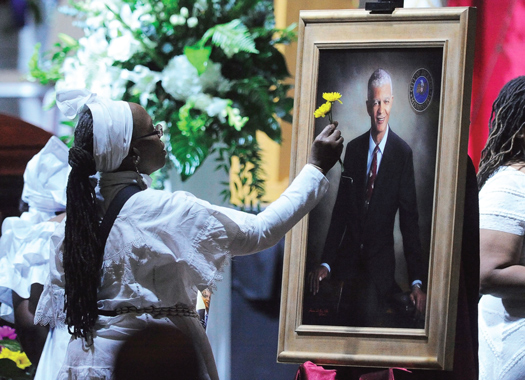
JACKSON, Miss. (FinalCall.com) – Roadways were lined for hours as people waited for conclusion of the near five-hour celebration of the life and legacy of Mayor Chokwe Lumumba here at the Jackson Convention Center Complex downtown.
Elders, parents and children who could not make it the near 5,000-seat capacity filled service, patiently sat and stood along the funeral procession route.
Whether on the hoods of cars, milk crates or lawn chairs, they waited for an opportunity to pay their respects and say thank you.
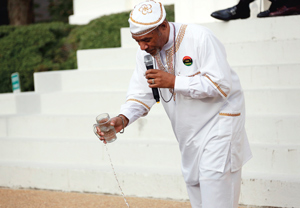
As the motorcade made its way toward the Autumn Woods Memorial Gardens for interment, clenched fists, hand waves and spontaneous shouts of “Free the land!” interrupted the calmness of the dry Mississippi air along Northside Drive.
Placards with the slogan, “One City, One Aim, One Destiny,” an adaptation of the cry of Pan-Africanist Marcus Garvey’s “One aim, one God, one destiny,” were displayed throughout the city.
Pictures of the late mayor could be seen on everything, from T-shirts to circulars, to abandoned buildings and storefronts. On this day it was all about Chokwe.
The Black nationalist flag and its colors of red, black and green was hoisted high above the cemetery’s entrance alongside the American flag by city fire engines.
A motif including the fallen mayor’s city hall portrait was presented to the family after an honor guard’s 21-gun salute. The city pulled out all stops to show appreciation for the accomplishments of its leader over only seven months.
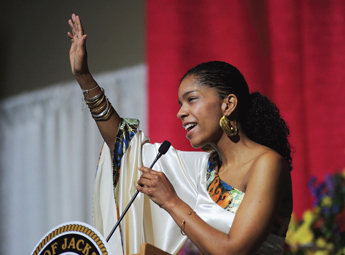
The services and memorials showed how far this committed freedom fighter and attorney had come in his bid to rebuild Jackson. The mourners were social justice and political activists, African-garb wearing revolutionaries, congressional and state lawmakers and some of nearly every segment in a city where the powerful, the White and even some established Blacks feared Mayor Lumumba’s coming to power.
His blend of commitment to the people and political pragmatism impressed a wide range of the powerful and the powerless as he pushed his agenda forward.
“My father was truly dedicated to human rights for human beings,” said son Chokwe Antar Lumumba. “He actually delivered that message throughout his campaign. He was a very disciplined listener and that was a shift from what people took from the prior administration. … He listened to people. He wanted to understand where they were coming from and what their positions were. So he incorporated people into the process.”
Mr. Lumumba and older sister Rukia eulogized their father during services March 8.
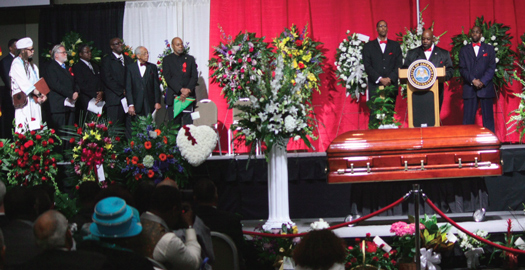
A statement from the Honorable Minister Louis Farrakhan was read by Dr. Abram Muhammad, the Nation of Islam state representative and student minister of Mosque No. 78 in Jackson.
“In all the years of my knowing him, I have only known him as a struggler, a warrior for the liberation of our people. From his days in Detroit to his days in Mississippi, he has always been a warrior for justice,” Min. Farrakhan said in the statement. “Although I am deeply saddened by his passing, the energy of his life and the ancestors upon whose shoulders we stand, is invigorating me and the members of the Nation of Islam to work harder to make a better people, a better nation to bring in a better world,” the Muslim leader closed.
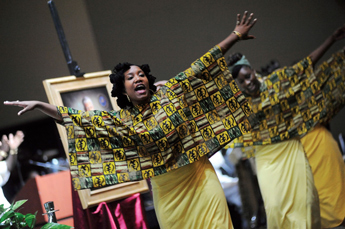
Local officials said Mayor Lumumba suffered from heart failure, denying family requests for an autopsy. The family was unconvinced, however, and an independent autopsy was conducted. The results are expected later this month.
The National Caucus of Black Lawyers mounted a campaign to raise funds for the procedures and Minister Farrakhan said March 2 in Chicago that money would not be a barrier in trying to get to the truth. The Minister vowed to provide any money needed to try to discover what happened to a longtime friend. Speaking at the end of a major address at the Nation’s headquarters, the Minister said, We must make sure our brother died under natural circumstances.
“Why should any doubts remain?” Washington Attorney Nkechi Taifa, a 40-year-friend of Mayor Lumumba told The Final Call. Ms. Taifa also met with Rep. John Conyers (D-Mich.) to request a formal federal review of Mayor Lumumba’s demise.
“We know from the evidence exposed in the COINTELPRO infiltration of Black organizations in the 1960s and 1970s, that the government is capable of, and willing to induce heart attacks in people,” Ms. Taifa continued, cautioning that she has no evidence of foul play in the death of Mayor Lumumba.
“We gonna ask a question: Who killed the mayor? We’d feel a lot better if there was an autopsy,” Kenneth Stokes, Hinds County supervisor, told a Jackson media outlet. “First they say it’s not a heart attack and not a stroke, then what was it? You don’t just die like that and you’re healthy.”
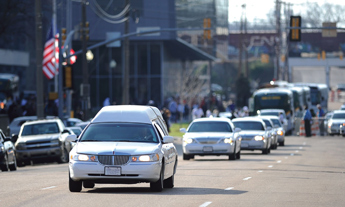
He was the lawyer for rapper Tupac Shakur during troubles and argued Blacks deserved reparations for forced enslavement of their ancestors.
As an attorney, he persuaded Mississippi’s Republican Gov. Haley Barbour to release two sisters from a Mississippi prison in 1996 after they had served 16 years for an armed robbery involving $11 that the women said they had not committed. He defended Black Liberation Army (BLA) members–including fugitive Assata Shakur–who were charged with robbing a Brinks armored car in 1981 in Rockland County, N.Y., in which three people were killed.
He was a cum laude graduate of the Wayne State Law School in Detroit, and a founder of the Malcolm X Grassroots Movement. He was born in Detroit in 1947.
His goal was to not simply govern the city effectively, but to also figure out “how do you bring African people and other oppressed people from a sense of powerlessness, to a sense of electoral power, and beyond that economic and social power.”
The challenge of Mississippi Apartheid
Chokwe Lumumba, the organizer, had to win several communities over to make his vision a reality. There were Whites and some Blacks of the old guard who supported a system benefiting the very wealthy and the comfortable.
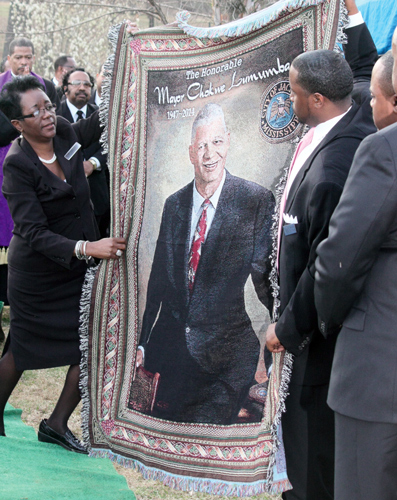
Whites had moved out of the 80 percent Black city of Jackson, while maintaining the economic reins, leaving city infrastructure to rot. The new mayor pushed for revitalizing infrastructure and laid out plans for business development and revitalizing Black neighborhoods. The city will also benefit from a one percent tax he supported.
Mr. Lumumba was labeled negatively by the media and in other establishment circles but his brand of organizing, self-determination and love eventually silenced most critics.
“He really stayed true to his belief, his mission and his purpose,” said daughter Rukia. “He could bridge what some would call racial gaps. Because he had the same message no matter whom he was talking to.”
The mayor was also unabashedly committed to the Black community and expressed a determination to make Jackson a model for how Black life could be improved.
On March 7 as throughout the week, flags flew half-staff around the city. The Fruit of Islam stood guard at the City Hall entrance during viewing of the mayor as he lay in state. The message clearly before, during and after the memorial service was stay the progressive course the mayor had set in motion.
Sharing the podium were state and city officials, friends and revolutionary comrades. Organizations included the December 12th Movement, the Malcolm X Grassroots Movement; the New African Peoples Organization; the Republic of New Africa, the Nation of Islam; the NAACP; the National Council of Black Lawyers and the Mississippi Legislative Black Caucus now known as The Lumumba Council of the State of Mississippi.
Rep. Bennie Thompson (D.-Miss,); Myrlie Evers former NAACP national president and widow of slain civil rights leader Medgar Evers; and Hollis W. Muhammad were among the many heard over the week of celebration.
“Like Thurgood Marshall, Chokwe used the law as a great sword for people who the courts wanted to pretend had no rights. Like Malcolm X, he insisted that it was the right of every human being to defend themselves. And like Dr. Martin Luther King, Jr., he invested his life in the south with an infectious love for all humanity. Simply, Chokwe was the best friend any poor Black person in a Mississippi court could ever have,” Ben Jealous, former NAACP head told The Final Call.
“I have known Mayor Lumumba since 1974. One of the reasons I was so public about my support for the Mayor was that I believed once people got to know the real Chokwe Lumumba, they would find him to be an extremely bright, caring, and humble individual,” said Rep. Thompson.
“Chokwe Lumumba was one of the finest sons of our people. Chokwe Lumumba was motivated by his vision of a liberated New Afrika and a New World. He loved our people and was loved by them,” said the New Afrikan Peoples Organization and the Malcolm X Grassroots Movement on his Feb. 25 passing. “Chokwe Lumumba’s name will always be mentioned as one of the finest revolutionaries and freedom fighters of our time and our history.”
A new Black politic?
“He was a new model of what Black politics ought to be and he was an example of a new kind of Black politician. He was a breath of fresh air that had not been breathed for decades in America,” commented New Orleans-based scholar and longtime friend and advisor Dr. Mtangulizi Sanyika. “The revolutionary heart and strategy of Chokwe Lumumba is kind of like what Mandela did but on another level. He impacted the consciousness of South Africans to be reconciled and Chokwe did the same thing here. Chokwe started with the infrastructure and that is a huge benefit to the Black community here. If you invest in infrastructure, that’s a huge quality of life change. Chokwe got the masses of the people behind him and that’s what the model is here. Because he won the hearts, minds and souls of the masses of the people he was given the mandate to change the city. The business community saw that they cannot win the public battle. So they had to make effective and comfortable compromises for themselves,” he said.
“Long live Chokwe. I hope a thousand more Chokwes bloom. We need to capture this, study this and figure out how to replicate this. That’s our challenge. Our political science people should have a seminar and study Chokwe Lumumba as a Black nationalist, a human rights activist, as an elected official. It’s a rare combination we don’t see in Black America that often. We need to package our findings and train others as to how to do this,” he added.
Thousands flooded the city of Jackson over the days leading up to the weekend services with many acknowledgements consistently sharing the same message. That message being that Chokwe Lumumba’s life was one dedicated to justice, family, and freedom.
Final Call staff contributed to this report.












